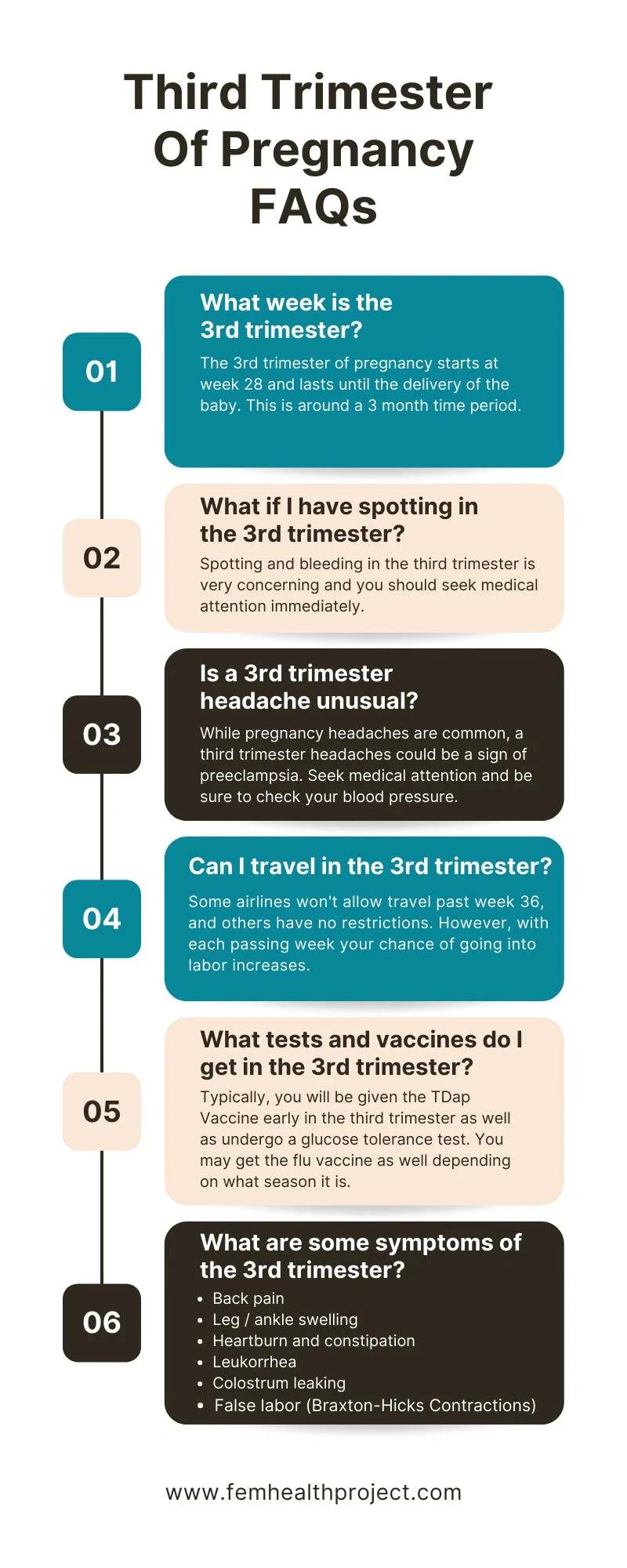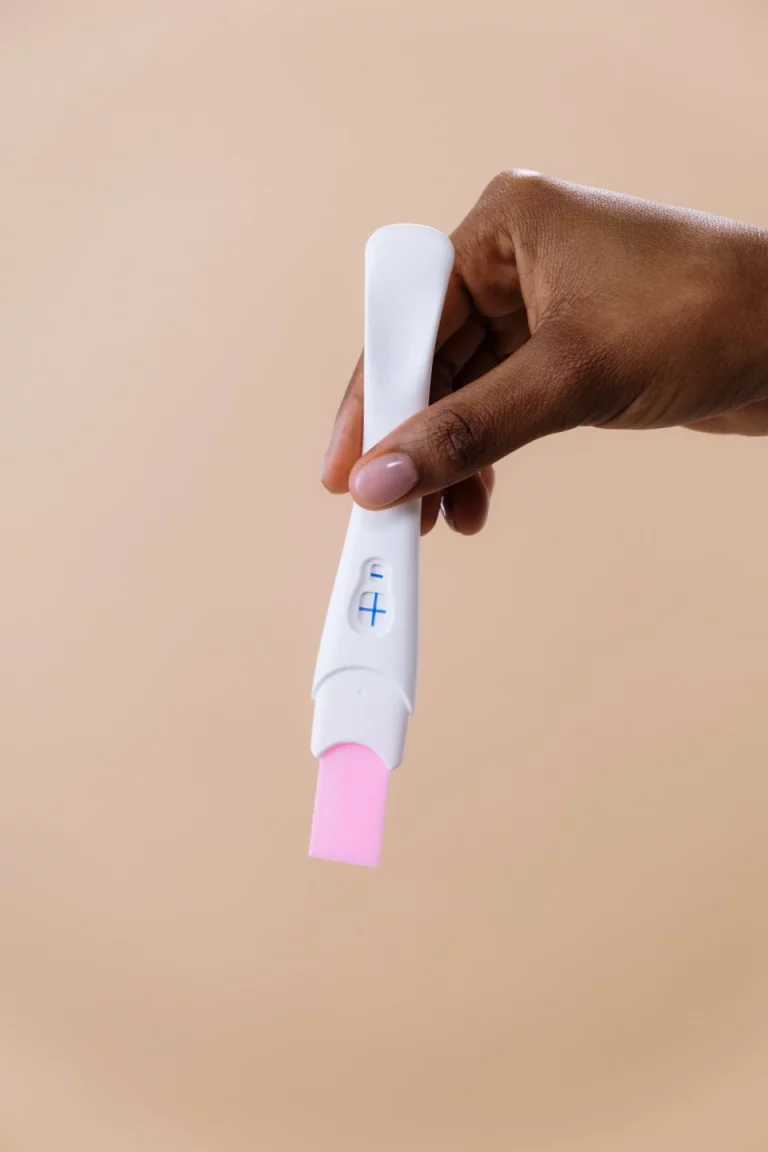Third Trimester Of Pregnancy: Everything You Need To Know!
What Week Is The Third Trimester?
Many people often wonder, “When does the third trimester begin?” The third trimester begins in week 28. The third trimester lasts from week 28 to the end of pregnancy, usually going not much longer than 40 weeks and 6 days. The third trimester is when you may begin to increase the frequency of your doctor’s visits from once a month to perhaps once in 2 weeks. In the last month of the third trimester, pregnant persons may be seeing your doctor every week. In the beginning of the third trimester, you will also get your TDap vaccine for pregnancy, as well as undergo your glucose tolerance test.
How Long Is The 3rd trimester Of Pregnancy?
The third trimester lasts around 3 months (months 7, 8 and 9) and goes on till you give birth (around week 40).
Headaches In Third Trimester?
Pregnancy headaches are commonly experienced by many people and are more common in the first and third trimester. They can occur due to changing hormones and a myriad of causes. While mild ones are okay and can be self-treated you should let your healthcare provider know if you’re having more severe headaches.
Severe headaches during the third trimester headaches can sometimes be caused by Preeclampsia which is a condition of hypertension (high blood pressure). Mayo clinic deems it abnormal, if your blood pressure is above 140/90 on 2 different occasions at least 4 hours apart. (1)
It is recommended to try and relieve mild headaches by natural means. If not, it is important to talk to a healthcare provider about any medications that you may be taking for these headaches.
Is Spotting In The Third Trimester Okay?
Spotting in pregnancy, during any trimester, should prompt you to call your doctor. You can expect your doctor to check for cervical polyps and ensure that your cervix is closed. The doctor may also do an ultrasound to evaluate the health of the growing fetus and the viability of the pregnancy. (4)
Third Trimester Travel: Is It Safe?
According to the Mayo clinic, the best time for pregnancy travel is before 36 weeks. Remember to discuss the details of your travel with your ob-gyn to ensure maximum comfort and care. However, you can expect that it will be more difficult to move around or sit for extended periods during travel.
Most airlines allow flying until 36 weeks (well into the third trimester). Radiation exposure at the altitude of air travel is not considered problematic for flying during pregnancy. (2)
Remember that there is still a possibility of going into labor between 35 and 36 weeks. If you do choose to travel this late in pregnancy, be sure to choose a destination with adequate medical care available. Make sure to stay hydrated and stretch often!
There are some situations in which third trimester travel is not recommended. Pregnant persons experiencing the following 3 P’s are recommended not to travel during pregnancy:
Related: Heavy Implantation Bleeding: Pregnancy Or Period?
1. Preeclampsia: High blood pressure in pregnant women
2. Prelabour rupture of membranes (PROM): rupture of amniotic membranes that generally should not happen before labour.
3. Preterm labor: This usually occurs shortly after PROM
What Are The Symptoms Of The Third Trimester?
False labor (Braxton-Hicks contractions): False labor contractions may start in preparation for childbirth.
Difficulty breathing: Some women may experience third trimester shortness of breath. Improvements in posture may help your lungs expand to help your breathing.
Pregnancy Swelling Ankles and Feet: During pregnancy swelling feet can happen. Elevating your legs and exercising will help ease the swelling. In some cases, pregnancy swelling can be a sign of something more dangerous like a blood clot. Be sure to show your swelling to your doctor, and if you have pain or swelling that is one-sided, seek medical care immediately.
Third Trimester Back Pain: Hormones released during pregnancy cause the connective tissue around your bones to relax which causes back pain in the third trimester. This increases the need for good posture through exercise to strengthen your muscles and with the help of chairs that provide back support.
Heartburn: Pregnancy hormones also relax the lower esophageal sphincter (the valve between the stomach and esophagus). This allows for stomach acid to back up into your esophagus. Eating frequent smaller quantity meals and avoiding acidic foods like citrus fruits along with fried or spicy food may prevent heartburn.
Heat: At this time, the fetus begins to radiate body heat which can make you feel hotter than normal.
Red-purple/swollen veins: There is an increase in blood circulation in your body to keep up with yours as well as the fetus’s needs. This causes red-purple veins to surface on your face neck and arms. It may also cause your veins to swell. High fiber and fluid intake is important.
Hair growth: Pregnancy hormones can cause courser and faster growth of hair on your arms legs and face.
Frequent urination: Third trimester pregnancy involves the baby moving deeper into the pelvis creating more pressure and the frequent need to urinate. This can also cause leaking. Panty liners may be useful to manage leaking when you laugh, cough or sneeze.
Colostrum leaking: The first form of milk begins to leak from your nipples until breastmilk is ready for your baby.
Leukorrhea: This is white vaginal discharge that is normal to produce at this time as it contains more mucus.
Other Third Trimester Symptoms: Leg cramps, stretch marks, loss of sex drive, skin pigmentation, constipation, hemorrhoids, dry or itchy skin due to stretching of the skin around your abdomen are amongst other changes and symptoms you may experience during this time. (3)
Third Trimester Of Pregnancy: Take Home Points
- In the third trimester, your baby will begin to take position and continue to grow in size and weight that may cause you to experience new or more intense symptoms.
- Don’t be afraid of all the physical and mental changes! Exercise and stay in close contact with your doctor regarding any severe symptoms you may be experiencing.
- Third trimester travel may be safe until close to your due date. Make sure to discuss any plans with your OB-GYN!
- Listen to your body while navigating the third trimester of pregnancy. If your third trimester pregnancy symptoms seem unusual, it is important to contact your doctor.
Sources:
- https://www.mayoclinic.org/healthy-lifestyle/pregnancy-week-by-week/expert-answers/headaches-during-pregnancy/faq-20058265
- https://www.mayoclinic.org/healthy-lifestyle/pregnancy-week-by-week/expert-answers/air-travel-during-pregnancy/faq-20058087
- https://www.stanfordchildrens.org/en/topic/default?id=third-trimester-85-P01242
- https://americanpregnancy.org/healthy-pregnancy/pregnancy-concerns/spotting-during-pregnancy/
We discuss products we think are useful to people. If you buy something through our links, we may earn a commission. Remember to check with your personal physician to see if a product recommended is right for you.








